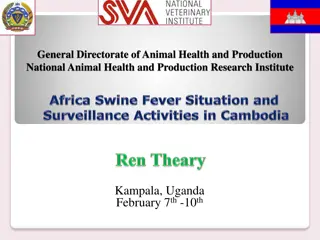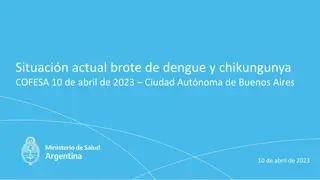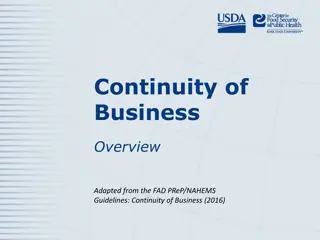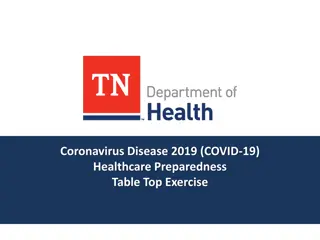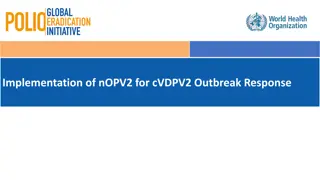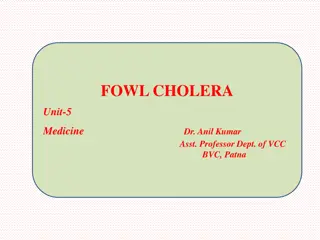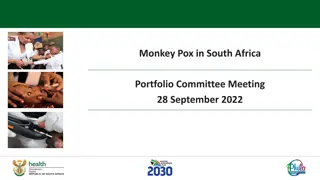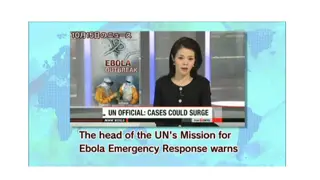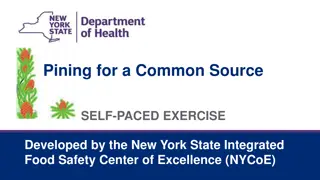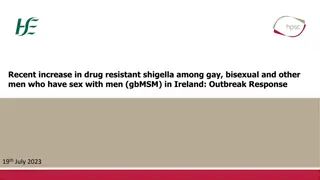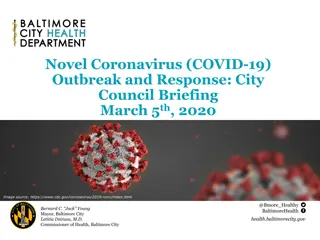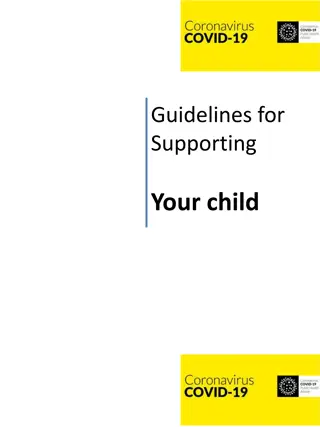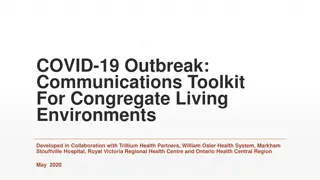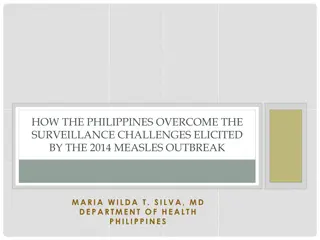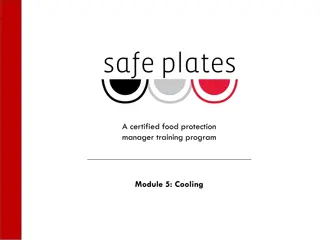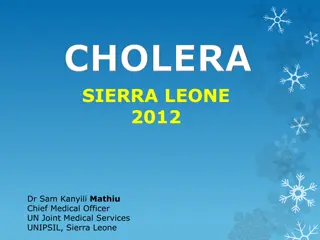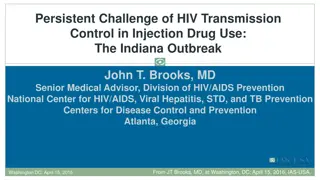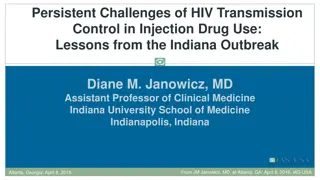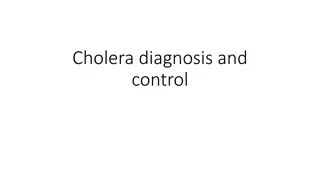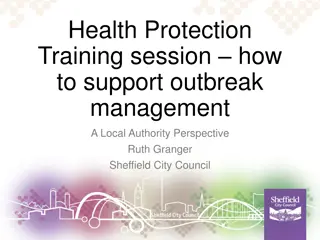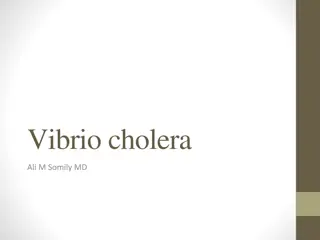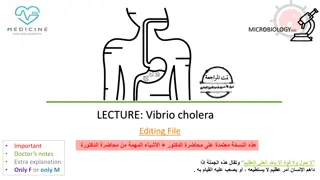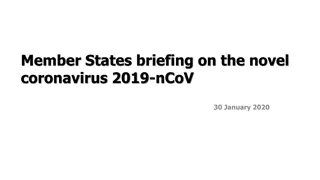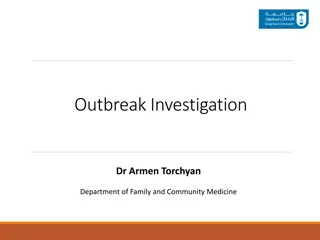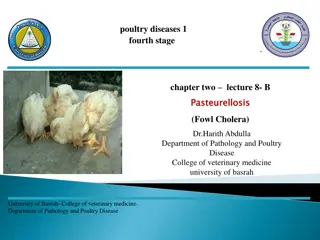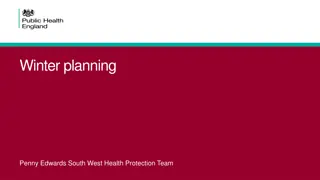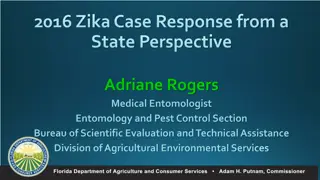Influenza A(H3N2)v at Jackson County Junior Fair 2022
Learn about an Influenza A(H3N2)v outbreak investigation at a fair. Understand the control steps taken and public health recommendations. Discover the partners involved and outbreak timeline details. Explore case definitions and surveillance methods. Popular
0 views • 14 slides
ASF Outbreak Surveillance and Control Strategies in Cambodian Pig Farming
An overview of the African Swine Fever (ASF) outbreak in Cambodia, highlighting the detection of outbreaks in various provinces, outbreak containment efforts, common pig diseases in Cambodia, surveillance objectives, and sampling methods for ASF detection in pigs. The initiative aims to prevent ASF
0 views • 20 slides
Water Crisis in Hammanskraal and Green Drop Watch Report
The water crisis in Hammanskraal is due to inadequate waste water treatment facilities, leading to pollution of water sources and a cholera outbreak. The Green Drop Watch Report highlights the critical conditions of municipal wastewater systems in South Africa, with many systems failing to meet stan
0 views • 11 slides
Current Situation of Dengue and Chikungunya Outbreak in Buenos Aires, April 10, 2023
The current situation report covers the outbreak of dengue and chikungunya in the Ciudad Autónoma de Buenos Aires as of April 10, 2023. It provides epidemiological data at both regional and national levels, detailing the cases reported, outbreaks, and preventive measures taken in the affected areas
2 views • 51 slides
Building Resilience Against Cholera Outbreaks: Lessons from IHR Framework
Exploring how the International Health Regulations (IHR) can enhance preparedness and response to cholera outbreaks. Discusses the functional components of IHR, the role of National IHR Focal Points, and best practices in building resilience. Highlights the importance of coordination, communication,
2 views • 20 slides
Update on Cholera Outbreak in Gauteng and Free State Provinces - May 24, 2023
National Institute for Communicable Diseases confirmed a Cholera outbreak in Gauteng and Free State Provinces. A total of 53 cases have been confirmed, with 9 in Free State and 44 in Gauteng. Updates on cases, testing, and hospital admissions provided. Stay informed about the current situation.
1 views • 21 slides
A Look Into Cholera Control and WASH Services Worldwide
The World Health Organization, along with the Global Task Force for Cholera Control, is focusing on analyzing reported cholera cases from 2010-2021 and the levels of water, sanitation, and hygiene (WASH) services in various countries. The report highlights the importance of basic WASH services in pr
3 views • 9 slides
Comprehensive Overview of Continuity of Business in FAD Outbreaks
Continuity of Business (COB), also known as managed movement, is a crucial strategy that allows the movement of non-infected animals and non-contaminated animal products during a Foreign Animal Disease (FAD) outbreak. This approach helps maintain normal business operations in agriculture and food in
4 views • 27 slides
Understanding Vibrio Cholerae: Biology and Impact on Human Health
Vibrio cholerae is a significant bacterium responsible for causing cholera, a life-threatening diarrheal disease. With over 35 species in the Vibrio genus, only a few can infect humans. Vibrio cholerae is a Gram-negative, curved aerobic rod that produces an enterotoxin leading to cholera. Understand
0 views • 23 slides
Overview of Vibrio cholerae: Characteristics and Identification
Vibrio cholerae is a gram-negative, curved rod bacterium known for causing cholera. Its distinctive features include polar flagellum motility, oxidase-positive nature, and resistance to inhibitory substances. Various culture media are used for its isolation and growth, such as transport, routine, an
0 views • 8 slides
Impact of Industrial Revolution on European Society
The Industrial Revolution had a profound impact on European society, characterized by key terms such as Agricultural Revolution, Capital, Pig Iron, Wrought Iron, Tariffs, Cholera, and Trade Unions. This period saw advancements in agricultural techniques, the rise of material wealth for production, t
1 views • 24 slides
Healthcare Preparedness for COVID-19 Outbreak - Exercise Objectives
Provide an opportunity to evaluate response concepts, plans, and capabilities for handling a novel viral disease outbreak. Objectives include minimizing morbidity, preserving social function, and improving hospital preparedness. Focus on surveillance, infection control, healthcare guidance, and comm
0 views • 26 slides
Implementation of nOPV2 for cVDPV2 Outbreak Response
Circulating Vaccine-Derived Poliovirus (cVDPV) outbreaks, particularly cVDPV type 2 (cVDPV2), have increased in recent years. The novel oral polio vaccine type 2 (nOPV2) is an innovative tool developed over nearly 10 years to combat these outbreaks. Clinical trials have shown that nOPV2 provides com
0 views • 18 slides
Understanding Fowl Cholera in Birds: Causes, Symptoms, and Management
Fowl cholera, a septicaemic disease affecting birds, is caused by Pasteurella multocida. It can affect all species of birds, with older birds more susceptible. The disease can spread through carrier birds, excretions, carcasses, and even rats. The virulence factors, clinical signs, and forms of the
2 views • 9 slides
Monkeypox Outbreak in South Africa: Updates and Actions Taken
Monkeypox cases have been reported in South Africa, with a total of five confirmed cases and no deaths as of September 2022. The World Health Organization (WHO) has declared the outbreak a public health emergency of international concern and issued recommendations to contain the spread. Actions have
2 views • 4 slides
UN's Warning: Ebola Infections Could Surge to 10,000 Per Week by December
The head of the UN's Mission for Ebola Emergency Response is warning that the outbreak of Ebola could see a significant increase in new infections, potentially reaching 10,000 per week by early December. Urgent measures, including isolating infected individuals and safe burials, are vital to prevent
0 views • 15 slides
Botulism Outbreak Investigation in Amarillo: Timeline of Events
The botulism outbreak in the Panhandle led to a swift response by health authorities, with cases identified, antitoxin administered, and CDC involvement. Investigations revealed common food sources and potential criminal activity, highlighting the urgency and collaboration in managing the situation.
0 views • 16 slides
Foodborne Illness Outbreak Investigation Procedures and Protocols
In this self-paced exercise developed by the New York State Integrated Food Safety Center of Excellence, learners will delve into the intricacies of investigating foodborne illness outbreaks. The course covers topics such as identifying outbreak patterns, roles in outbreak investigations, interpreti
0 views • 171 slides
Recent Increase in Drug-Resistant Shigella Among gbMSM in Ireland: Outbreak Response
Shigellosis infection, particularly among gay, bisexual, and other men who have sex with men (gbMSM), has seen a recent surge in drug-resistant cases in Ireland. An Incident Management Team (IMT) has been actively addressing this outbreak since March 2023. This update provides insights into the epid
2 views • 17 slides
Addressing Challenges in Controlling EATEX-D Outbreak
The session explores the challenges in controlling the EATEX-D outbreak, including the death rate, transmission modes, and public response. It delves into specific issues like concentrated cases in Downville and the effectiveness of self-quarantine strategies. The dialogue captured from social media
0 views • 24 slides
Information on COVID-19 Outbreak and Response in Baltimore City
COVID-19 outbreak briefing from Baltimore City Council on March 5th, 2020, including details on the disease, transmission, symptoms, global spread, and cases in the US. Provides insights on prevention, treatment, impact on Baltimore, and common questions addressed by Mayor Bernard C. Jack Young and
0 views • 43 slides
Supporting Your Child Through the COVID-19 Outbreak
This guide provides strategies to support your child during the COVID-19 outbreak, focusing on emotional well-being, routines, social stories, activities, desensitization for testing, and managing anxiety. It emphasizes maintaining a routine, social connections, outdoor activities, and healthy habit
0 views • 32 slides
Impact of COVID-19 Outbreak on Sustainable Development: A Neural Network Modeling Approach in Hubei Province
This study investigates how the COVID-19 outbreak affects environmental health, economy, and sustainable development using a binary classification model with neural network methods. Factors like weather parameters and confirmed cases were analyzed to understand the impact, emphasizing the importance
0 views • 16 slides
COVID-19 Outbreak Communications Toolkit for Congregate Living Environments
This communications toolkit, developed in collaboration with multiple health organizations, provides guidance and resources for managing communication during a COVID-19 outbreak in congregate living environments. It includes information on processes, notifications, web updates, media relations, key
0 views • 34 slides
Strategies for Overcoming Surveillance Challenges During the 2014 Measles Outbreak in the Philippines
The Philippines faced surveillance challenges during the 2014 measles outbreak, including manpower capacity, logistics, data management, and reporting mechanisms. Key interventions involved activating surge capacity, conducting orientations, procuring specimen kits, and promoting efficient data coll
0 views • 18 slides
Resources and Strategies for Mental Health Providers During COVID-19 Outbreak
This resource provides helpful strategies for mental health providers during the COVID-19 outbreak, emphasizing self-care, staying informed, supporting essential personnel, ensuring safety, and addressing basic needs like food distribution and emotional safety for families. It also offers access to
1 views • 18 slides
Food Safety Incident Investigation: Baltimore City Illness Outbreak
Baltimore City experienced an illness outbreak linked to a lunch event, where 216 individuals fell ill after consuming contaminated food. The investigation revealed that improper handling and cooking of precooked frozen chicken led to the contamination with Clostridium perfringens. The incident unde
0 views • 40 slides
Understanding Cholera - Causes, Symptoms, and Prevention Strategies
Cholera is an acute intestinal infection caused by the bacterium Vibrio cholerae. It leads to watery diarrhea due to the production of a potent enterotoxin. The disease has two distinct life cycles - one in the environment and one in humans. Factors such as access to safe water and sanitation play a
0 views • 21 slides
Challenges in HIV Transmission Control in Indiana Outbreak
Injection drug use remains a persistent challenge in controlling HIV transmission, as highlighted by the Indiana outbreak. Dr. John T. Brooks addresses the changing patterns of injection drug use in the United States and the impact on new HIV diagnoses. The data presented shows the ongoing struggle
0 views • 51 slides
Challenges in HIV Transmission Control: Lessons from Indiana Outbreak
Addressing the persistent challenges of HIV transmission control in injection drug use, Dr. Diane M. Janowicz's presentation delves into the HIV outbreak in rural Indiana, interventions to halt the spread, and key elements for HIV treatment amidst the crisis.
0 views • 20 slides
Cholera Diagnosis and Control Methods Overview
Cholera diagnosis involves various laboratory tests such as specimen analysis, smears, and cultures. Slide agglutination tests and the oxidase test can also aid in the identification of Vibrio cholerae bacteria. Understanding these diagnostic methods is crucial for effective control and management o
0 views • 14 slides
John Snow and the Defeat of Cholera Outbreak
John Snow, a pioneering epidemiologist, challenged and solved the deadly cholera outbreak in London in 1854. By investigating the source of the disease and its spread, Snow identified contaminated water as the cause. His groundbreaking work led to significant advancements in public health and the un
0 views • 22 slides
Health Protection Training for Outbreak Management: A Local Authority Perspective
This training session, led by Ruth Granger from Sheffield City Council, focuses on supporting outbreak management from a local authority perspective. Participants will learn about the importance of health protection, the role of the Public Health representative in outbreak control teams, and the key
0 views • 41 slides
Understanding Cholera: Epidemiology, Microbiology, Clinical Features, and Management
Cholera is a water-borne disease caused by Vibrio cholera, characterized by severe diarrhea. Learn about its history, microbiological characteristics, pathogenesis, clinical features, laboratory diagnosis, management, and outbreak control. Discover the epidemiology, including major outbreaks and tra
0 views • 19 slides
Understanding Cholera: Epidemiology, Microbiology, and Clinical Features
Cholera is a life-threatening intestinal infection caused by Vibrio cholera bacteria. The disease is water-borne and prevalent in regions with poor sanitation. Learn about the epidemiology, microbiological characteristics, pathogenesis, clinical features, and management of cholera from this comprehe
0 views • 12 slides
Global Update on Novel Coronavirus Outbreak - January 2020
The evolving situation of the 2019-nCoV outbreak, with updates on confirmed cases, deaths, and affected countries. As of January 30, 2020, there are 7,818 laboratory-confirmed cases globally, with the majority in China. The outbreak has spread to several countries, prompting health emergencies progr
0 views • 15 slides
Outbreak Investigation and Management in Public Health
Outbreak investigation is crucial in understanding, distinguishing, and managing disease outbreaks. This involves identifying the nature of outbreaks, studying key terms like endemic and epidemic, and examining outbreak settings such as food-borne and water-borne scenarios. By investigating outbreak
0 views • 53 slides
Understanding Pasteurellosis (Fowl Cholera) in Poultry: Causes, Symptoms, and Management
Pasteurellosis, also known as Fowl Cholera, is an acute septicemic disease affecting domestic fowl and wild birds caused by Pasteurella multocida. This disease is characterized by high morbidity and mortality rates, primarily impacting chickens, turkeys, and ducks. The disease spreads through health
0 views • 10 slides
Winter Planning and Outbreak Control Measures for Health Protection Team
In preparation for winter, Penny Edwards from the South West Health Protection Team outlines key strategies for prevention, preparedness, and protection against respiratory illnesses such as COVID-19 and flu. The guidance emphasizes social distancing, hand hygiene, staff training on PPE usage, regul
0 views • 5 slides
The 2016 Zika Outbreak in Florida: State Response and Control Measures
In 2016, Florida experienced a Zika virus outbreak leading to public health emergency declarations and mosquito control initiatives. The outbreak began with travel-associated cases, followed by locally acquired transmissions prompting the implementation of aggressive mosquito control measures. Vario
0 views • 22 slides

